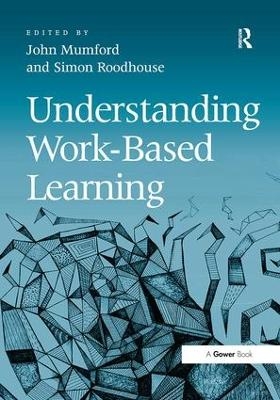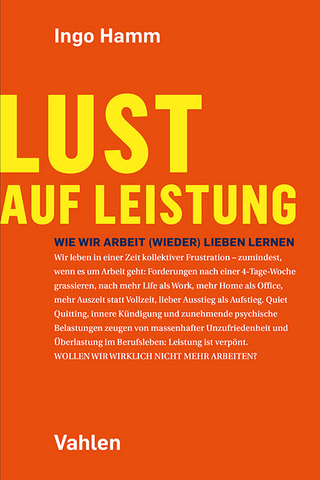
Understanding Work-Based Learning
Gower Publishing Ltd (Verlag)
978-0-566-09197-1 (ISBN)
This important book is for anyone who wants to make the most of work-based learning: employees, employers, educationalists, policy makers and researchers. It sheds light on ways of giving full-time employees the chance to take up learning opportunities which are of the same level and rigour as those on offer to the full time student. It approaches the subject from the perspective of the learner, drawing on case studies to provide detailed insight. It suggests that universities already have in place much of the machinery needed to support learners who are in work: they just don't make enough use of it. Look closely and you will find a substantial legacy of this kind of activity by universities. This is a book about seizing opportunities. In one volume, Understanding Work-Based Learning makes a valuable contribution to current employer engagement and learner demand debates, and provides first hand learner experiences to guide existing and potential work based learners, employers, educationalists, policy makers, and researchers.
Professor Roodhouse has substantial experience as an educator, manager and researcher in the fields of management, education, training and creative industries. He is extensively published in national and international journals such as, the International Journal of Arts Management, the International Journal of Museum Management and Curatorship, and the Journal of Arts Management, Law and Society. He has been guest editor of journals such as the Journal of Vocational Education and Training, and sits on various editorial boards including, most recently, the Education and Training Journal. His book on Cultural Quarters was published In 2006 by Intellect followed by Employers Skils and Higher Education published by Kingsham Press in 2007 and he is founding editor of the Creative Industries Journal with Middlesex University. Currently he is Professor at the Institute for Work Based Learning, Middlesex University and the University of Technology, Sydney. In addition he has worked with Dr Mumford at the University Vocational Awards Council as the founding Chief Executive and more recently the Technical Director at HE@Work Dr Mumford has been a champion of workplace skills and the accreditation of workplace learning for many years. He is chair of HE@WORK, and was until recently a board member of the Universities Vocational Awards Council. He is Visiting Senior Fellow at Surrey University School of Management, past Chairman of the Sector Skills Council for Oil, Gas, Chemicals and Nuclear, and a Board Member of Foundation Degree Forward, and the environmental charity Green-Works. Dr Mumford served at BP for over 30 years spanning senior management positions in Europe, Australasia and Asia. From 1998-2006, as BP Vice President UK Region, he dealt extensively with BP's reputation, governance and government relations issues. In 2003, Dr Mumford received an OBE, for his services to the environment. He is a noted public figure for his work in alternative energy and the environment particularly in transport.
Contents: Foreword; Introduction; Part I Making Sense of Work-Based Learning: The genesis of university work-based learning, Simon Roodhouse; Defining and theorizing university work-based learning, Simon Roodhouse; Legitimising work based learning programmes of study, Penny McCracken; University models of work-based validation, Tony Wall; Recognising, assessing and rewarding work experience, Jonathan Garnett; Supporting learners through mentoring in the workplace, Ann Minton. Part II The Learner's Experience: Introduction to case studies; Case study 1: an SME owner and an MBA; Case study 2: a police officer undertakes an external MBA; Case study 3: a supermarket dotcom training manager and a work-based degree; Case study 4: a senior manager, oil company vice president, and a PhD; Case study 5: a civil servant, a degree and professional qualifications; Case study 6: a care commission officer with the Scottish Commission for the Regulation of Care (care commission) and a graduate certificate; Case study 7: a learning architect, designing programmes that engage and a doctoral research programme; Case study 8: IT operations manager and a foundation degree in business management; Case study 9: a local authority manager and a work-based masters degree; Case study 10: working with children and learning recognition; Case study 11: a wife, mother, employee and a part-time degree; Case study 12: McDonalds and achieving a foundation degree; Case study lessons, John Mumford. Part III The Rights of the Learner: The informed learner; References; Index.
| Erscheint lt. Verlag | 28.12.2010 |
|---|---|
| Sprache | englisch |
| Maße | 174 x 246 mm |
| Gewicht | 453 g |
| Themenwelt | Wirtschaft ► Betriebswirtschaft / Management ► Personalwesen |
| ISBN-10 | 0-566-09197-6 / 0566091976 |
| ISBN-13 | 978-0-566-09197-1 / 9780566091971 |
| Zustand | Neuware |
| Haben Sie eine Frage zum Produkt? |
aus dem Bereich


